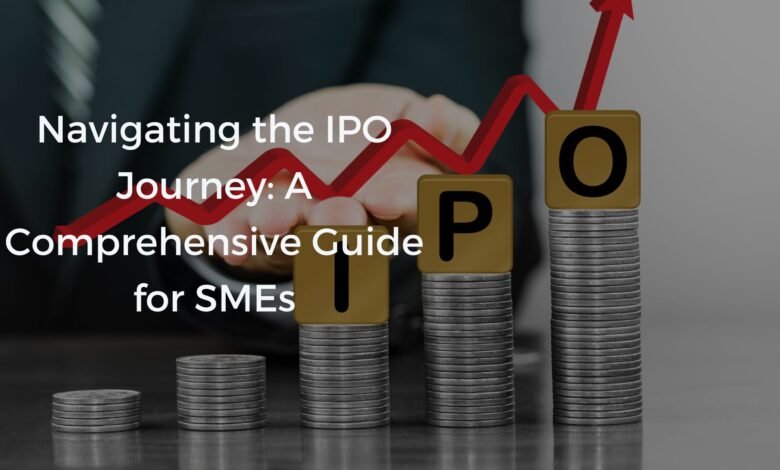Navigating IPO Journey: A Comprehensive Guide for SMEs IPO
A Comprehensive Guide for SMEs IPO

Introduction:
Embarking on the journey to take your small or medium-sized enterprise (SME) public through an Initial Public Offering (IPO) is a significant milestone. The IPO process, from meticulous preparation to the actual listing, is a complex undertaking that requires careful planning and the expertise of dedicated professionals. In this article, we will delve into the various stages of the IPO process and explore the critical role of SME IPO consultants and advisors.
IPO Basics: Understanding the Foundation
Before diving into the preparation and listing stages, it’s crucial to understand the fundamentals of an IPO. An IPO is the process by which a private company becomes a public company by offering its shares to the general public for the first time. This marks a transition from being privately owned to having shares traded on a public stock exchange.
IPO Readiness Assessment: A Prerequisite for Success
What is IPO Readiness Assessment?
An IPO Readiness Assessment is the initial step in the SME IPO journey. It involves a comprehensive evaluation of the company’s financial health, governance structure, and overall preparedness for going public. This stage is critical as it sets the foundation for subsequent steps in the SME IPO process.
The Role of Pre-IPO Consulting:
Pre-IPO consulting is a strategic initiative that helps SMEs identify and address potential challenges before they become roadblocks in the IPO process. Consultants work closely with the company’s leadership to optimise financials, streamline operations, and enhance corporate governance.
Preparation Phase: Crafting the Narrative
Financial Preparation:
During this phase, SMEs focus on presenting robust financial statements and demonstrating sustainable growth. This involves auditing financial records, ensuring compliance with accounting standards, and developing a compelling financial story to attract potential investors.
Legal and Regulatory Compliance:
Navigating the regulatory landscape is a key aspect of IPO preparation. SMEs must ensure compliance with securities laws, corporate governance standards, and any specific regulations pertaining to their industry.
Engaging IPO Advisers: Navigating the Complex Terrain
The Role of IPO Advisers:
IPO advisers play a pivotal role in guiding SMEs through the intricacies of the IPO process. These professionals, often financial experts and legal advisors, provide valuable insights on structuring the offering, pricing shares, and liaising with regulatory bodies.
SME IPO Consultants:
Specialised consultants focus on the unique needs of SMEs. They assist in developing a compelling business case, positioning the company in the market, and creating effective communication strategies for investors.
Listing Day: A Culmination of Efforts
Setting the Offering Price:
Determining the right offering price is crucial for a successful IPO. This involves considering market conditions, competitor valuations, and investor appetite. Striking the right balance is essential for attracting investors while ensuring fair value for existing stakeholders.
Market Debut and Beyond:
The listing day is a celebration of the SMEs journey to becoming a publicly traded entity. Post-listing, the company must continue to meet regulatory obligations, communicate effectively with stakeholders, and execute its growth strategies.
Conclusion:
Embarking on an IPO journey requires meticulous planning and the support of experienced professionals. From IPO readiness assessments to engaging IPO advisers, every step contributes to the successful transition from a private to a public company. The benefits of increased capital, enhanced visibility, and access to a broader investor base can be substantial for SMEs willing to navigate the complexities of the IPO process.
How Amicus Growth Advisors can help you with SME IPO consultants services in India:
Amicus Growth Advisors is a leading business consultancy firm in India, specialising in guiding SMEs through the intricacies of the IPO process. With a team of experienced professionals, Amicus provides comprehensive support, from IPO readiness assessments to engaging IPO advisers, ensuring a seamless journey to becoming a publicly traded entity. Explore our services to make your SME IPO a success.
FAQs: SME IPOs
How do you assess IPO readiness?
Assessing IPO readiness involves a comprehensive evaluation of a company’s financial, operational, and regulatory preparedness for an Initial Public Offering. This process typically includes a thorough examination of financial statements, corporate governance practices, internal controls, legal compliance, and management capabilities. Additionally, assessing market conditions, investor sentiment, and the competitive landscape is crucial. Experienced professionals, often including financial advisors, legal experts, and accountants, collaborate to ensure a holistic evaluation.
What is IPO assessment?
IPO assessment is the thorough examination and analysis of a company’s overall readiness to go public. This process involves evaluating various aspects, such as financial health, governance structure, compliance with regulations, operational efficiency, and market conditions. The goal is to identify strengths, weaknesses, and potential risks that may impact the success of the IPO. This assessment guides the company in making informed decisions to enhance its readiness for a successful public offering.
How long does IPO readiness take?
The timeline for IPO readiness can vary depending on the complexity and size of the company. On average, the process typically takes 12 to 24 months. This duration allows for the identification and resolution of any issues related to financial reporting, corporate governance, and compliance. Companies need sufficient time to enhance their financial transparency, establish robust internal controls, and ensure alignment with regulatory requirements.
What is IPO advisory services?
IPO advisory services involve providing guidance and support to companies considering or actively preparing for an Initial Public Offering. These services cover a wide range of areas, including financial structuring, regulatory compliance, risk assessment, and overall strategic planning. IPO advisory teams, often composed of financial advisors, legal experts, and other specialists, work collaboratively to help companies navigate the complexities of going public and maximise their chances of a successful IPO.
What does an IPO consultant do?
An IPO consultant assists companies in the process of going public. Their role includes providing strategic advice, conducting assessments of the company’s readiness, facilitating compliance with regulatory requirements, and coordinating with various professionals involved in the IPO process. IPO consultants leverage their expertise to guide companies through the complexities of transitioning from private to public ownership, aiming to ensure a smooth and successful IPO.
What is the role of an advisory accountant in the IPO?
An advisory accountant plays a critical role in the IPO process by providing financial expertise and strategic guidance to the company. Their responsibilities include conducting financial due diligence, ensuring accurate financial reporting, and advising on accounting policies. Advisory accountants collaborate with other professionals, such as legal advisors and underwriters, to address potential issues and enhance the company’s financial transparency. Their goal is to help the company present a robust financial picture to potential investors and meet regulatory requirements during the IPO process.
What is the primary purpose of an IPO Readiness Assessment?
An IPO Readiness Assessment evaluates a company’s readiness for going public, assessing its financial health, governance structures, and overall preparedness to ensure a smooth transition to the public markets.
How can SME IPO consultants add value to the IPO process?
SME IPO consultants specialise in addressing the unique challenges faced by small and medium-sized enterprises. They assist in developing a compelling business case, refining financials, and creating effective communication strategies to attract investors.


